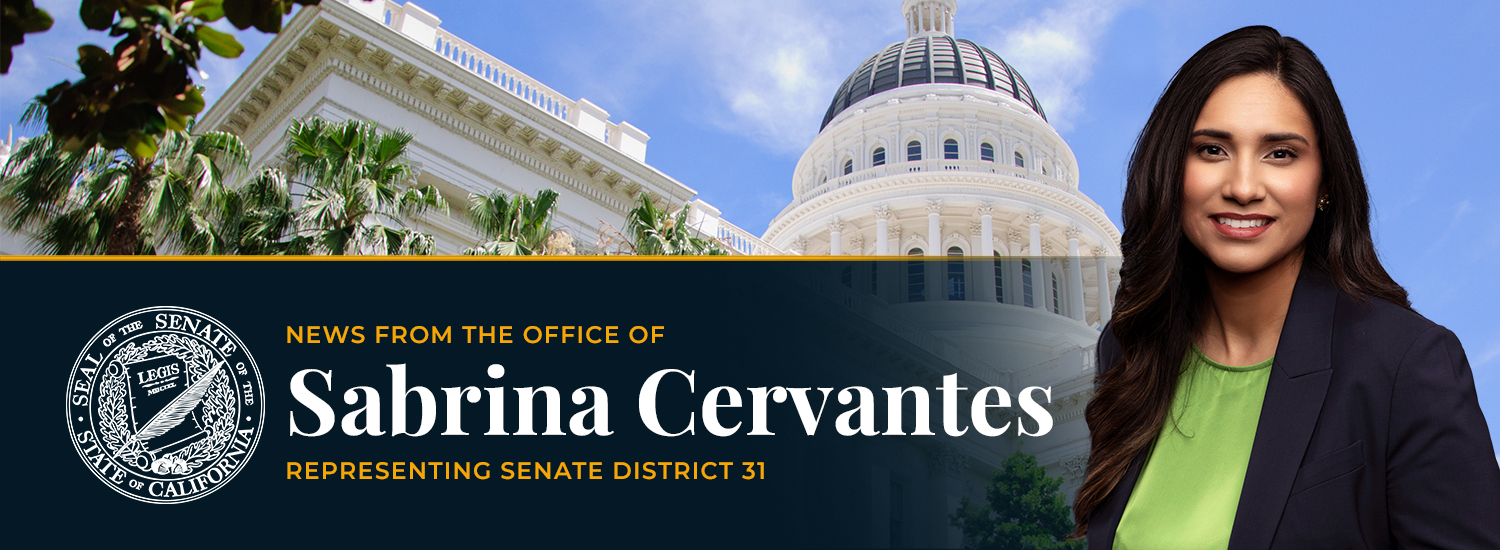
Governor Signs Eight Cervantes’ Bills
(RIVERSIDE, CA) --- Senator Sabrina Cervantes (D-Riverside) announced that Governor Gavin Newsom signed eight of her bills into law. These new laws will strengthen the defenses of our elections systems, support members of our immigrant community in their pursuit of education, provide guardrails against the misuse of artificial intelligence at our community colleges, and prevent the federal government from weaponizing our vital records.
“I am pleased that the Governor signed bills I authored that will provide common-sense solutions to the challenges faced by our Inland Empire community and working families throughout California,” said Senator Sabrina Cervantes.
Senator Cervantes’ bills signed by the Governor:
- SB 3 – Reforming the Signature Curing Process: This bill makes several reforms to the signature curing process, including requiring county registrars to only accept signature cure forms from voters if the form template used was issued by the Secretary of State or a county registrar. SB 3 now adds a statement next to where voters sign on the vote-by-mail ballot envelope declaring that in order for their ballot to count, their signature must be found to compare with the signatures for the voter that the registrar has on file, which can include the signature on their driver’s license or state identification card.
- SB 241 – AI Protections for California Community College Counselors: This legislation is a follow up to Assembly Bill 2370, which Senator Cervantes authored in 2024 in the State Assembly; it prohibits replacing community college faculty with artificial intelligence. SB 241 expands the list of instructor and faculty positions covered by AB 2370 to include, among others, librarians and counselors.
- SB 307 – DREAMers Completing Higher Education at UC and CSU: Senate Bill 307 requires the California State University, and request the University of California, to implement additional precautionary measures for undocumented students who are subject to federal immigration enforcement activity. These measures include the adoption of a system-wide policy that addresses course grades, administrative withdrawal, and reenrollment for undocumented students who are detained, deported, or unable to attend classes due to immigration enforcement activity by federal authorities.
- SB 313 – Removing Parental Birthplace on Public Birth Certificates: In response to the growing threat of federal immigration enforcement and weaponization of public data, this bill now requires a child’s parents’ places of birth to be included only on the authorized copy of child’s certificate of live birth—which is restricted and contains confidential medical and demographic information—and not on the informational copy, which can be obtained by any member of the public.
- SB 670 – Adult Immigration Education – Integration: Senate Bill 670 clearly defines immigrant integration for the purpose of adult education programs. The California Council for Adult Education and the California Adult Education Administrators Association cosponsored the bill.
- SB 671 – Accessible Pedestrian Signals: In order to continue to make California streets more accessible to the nearly 1.3 million Californians with significant vision loss, SB 671 codifies existing California Department of Transportation policies that require touch-free accessible pedestrian signals, or APS, be installed at state-owned or -operated crosswalks.
- SB 851 – Safeguarding California’s Elections Systems against Federal Intervention: This legislation protects the essential sanctity of the places where Californians cast their ballots. Specifically, it safeguards existing prohibitions against the hiring or arranging of peace officers at voting locations-- treating federal and local law enforcement equally. The bill will now also protect county registrars from being pressured by the federal government to refuse to certify the results of an election by clarifying that the role of county registrars in certification is ministerial and non-discretionary.
One piece of legislation—Senate Bill 280, which called for the November statewide special election—was signed by the Governor in late August.